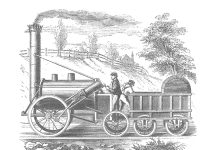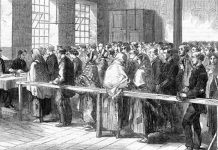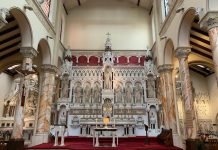In October of 1828, a new paper appeared on the streets of Manchester.
It joined a crowded market, the Guardian had been born seven years earlier, one of its founder was a man called Archibald Prentice and he would be the editor of this paper. About Manchester takes a look at his life.
It was said that just three years after helping to launch the Guardian, Prentice left in protest three years later saying that its politics had become too tentative for him.
Prentice was not a Mancunian by birth, the son of a Scottish farmer, he had been born in Lanarkshire in 1792, training in the muslin business of Mr Grahame of Glasgow, and traveling to the North of England over a period of two years selling its wares.
He settled in Manchester in 1815, Napoleon defeated and the hopes of Wellington’s victorious soldiers for a new future brightly shining. Prentice opened a warehouse at No 1 Peel Street as a branch of his Glasgow employer. The corn laws had been passed and that bright future would quickly wane.
A businessmen by day, he talked politics at night, quickly establishing himself in the radical political circles that were springing up in the town. “Faithful towards Liberal principles amongst the faithless in the town” he would later say. This was the period of Castlereagh, government spies would watch for any agitators.
He began writing for the Manchester Gazette, later he would buy it,helped by some of the Guardian’s founders who thought the paper had not gone far and fast enough in advancing the principles of liberalism.and quickly became involved in the radical politics of the region.
In 1818 he would appear as a witness at the trial of John Edward Taylor and the following year would watch the procession make its way to Peter’s Fields.
( he went to the outskirts of the meeting but would leave after the arrival of Henry Hunt and would only hear of the tragedy at his Salford home.)
The Manchester Gazette would not be a success, merging with the Examiner in 1828 and eventually evolving in the Manchester Times. Prentice became its editor staying involved with the paper until 1847.
Politically though, he was moving on. Supporting the moves for Parliamentary reform, he addressed a crowd of over three thousand in 1826 on the subject of giving Manchester an MP and abolishing the so called rotten boroughs.
He became a member of the committee for Parliamentary reform, and would also play a part in local government opposing the imposition of the police reform bill. He was a vehement opponent of the slave trade and would campaign for the extending of the education system to the young and the use of Sunday schools.
In 1831 he famously found himself embroiled in a libel case launched by John Grimshaw after he had published the phrase “JOHN GRIMSHAW. commonly called Captain Grimshaw, principally remarkable for giving bawdy toasts. And for a countenance which seems to blush at his own lewdness.”
The case at which Prentice defended himself ended in a hung jury after they had been locked in for five teen hours and he was acquitted.
The reform bill passed in law in 1832, Prentice turned to the Corn Laws, forming the Manchester Anti Corn Law association, a precursor to the League. Between its founding and their repeal, he spoke, wrote and lectured about his opposition, attending, it was said over one thousand, one hundred events.
In his later years we would continue to write, though away from the journalism and pamphlets of his earlier days. His historical sketches and personal recollections of Manchester 1792-1832 was written as an account of the changes in unlicensed opinion in the town up to the reform act. He would also write a history of the anti Corn Law league. The two books today can be regarded as his memoirs.
He would travel to America in the 1850’s publishing a small volume of his impressions of the country, its people and its institutions.
He died at the age of sixty five still working for the people of Manchester. Days before his illness he had been appointed to the gas office of the Manchester Corporation.
On his death the Manchester Guardian described him as an ardent and enthusiastic radical reformer who had survived to see many of his larger visions of freedom come to fruition.







